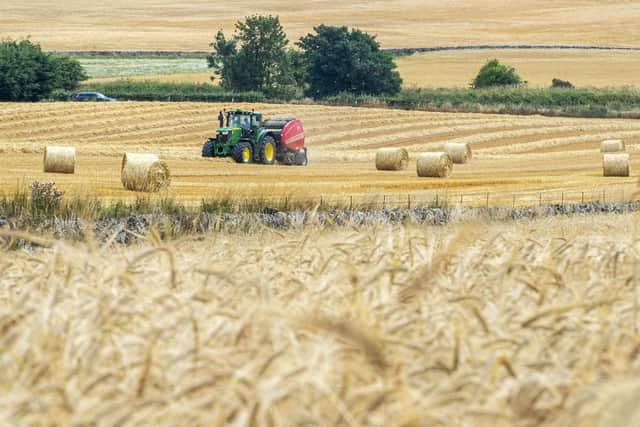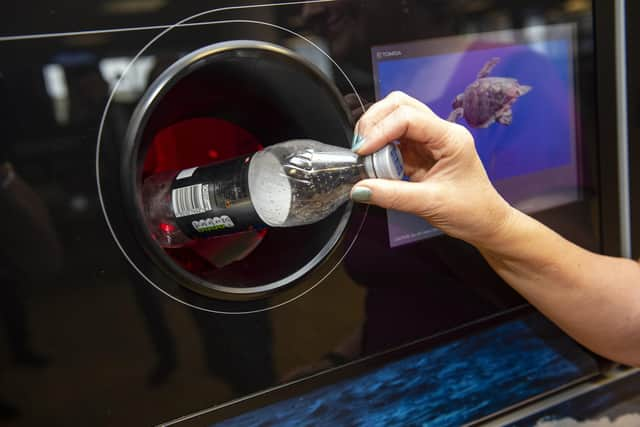COP26: Scotland still facing stiff tests to meet carbon reduction targets
WWF Scotland director Lang Banks, giving his verdict on the country’s role at the COP26 conference, said "Despite not having a seat at the negotiating table, the Scottish Government has championed real collaborative action with other states, signed cooperation agreements with nations such as Chile, and Denmark in protecting peatlands and decarbonising heat.
"More importantly, they have tripled their funding for climate justice and become the first nation in the world to pledge finance to countries facing loss and damage that have already been affected by climate change.
"That’s a really powerful message to be sharing.


Advertisement
Hide AdAdvertisement
Hide Ad"Scotland has played a positive role here, but it can’t rest on its laurels.
“The First Minister herself said that she needs to be made uncomfortable because she realises here in Scotland we have also missed our targets.”
The Scottish Government failed to reach its latest interim target towards zero emissions, achieving 51.5 per cent overall last year compared to the required 55 per cent.
It has a target of 75 per cent by 2030 and 100 per cent by 2045.


Rohinton Emmanuel, professor in sustainable design and construction at Glasgow Caledonian University, said the final deal at COP26 would have important implications for Scotland.
He said: "The two key climate change risks for Scotland – flooding and overheating – need firm action plans at city and national levels.
"Specific and detailed mapping of these risks and adaptation plans to minimise their negative consequences must be pursued vigorously.”
Prof Emmanuel added that phasing out fossil fuels would be another challenge.
Advertisement
Hide AdAdvertisement
Hide AdA clause of the COP26 agreement, revised at the last moment, calls for countries to “accelerate the development, deployment and dissemination of technologies, and the adoption of policies, to transition towards low emission energy systems, including by rapidly scaling up the deployment of clean power generation and energy efficiency measures, including accelerating efforts towards the phasedown of unabated coal power [not linked to carbon capture schemes] and inefficient fossil fuel subsidies, recognizing the need for support towards a just transition.”
He said: “Given our part in historic carbon emissions, there is a need to show leadership in mitigation, even if all of the cards are not within our control.
"As a consequence of climate change, we too will need to develop strong adaptation plans as everyone else, while action on climate finance and loss and damage would be useful.
“Given what the science of climate change has made abundantly clear, it is no longer possible to base any of our economic activities on fossil fuels.
"However, their elimination from our economy needs to happen in an orderly and just manner.
"It will take time and we need to be mindful of the thousands of jobs and livelihoods at stake.
“Lobbying for the withdrawal of fossil fuel subsidies – in our case, gas and liquid fossil fuels – will be an important start.
“A transition to renewable sectors using the same assets and skills as the fossil fuel sector could be a promising mechanism.”
Advertisement
Hide AdAdvertisement
Hide AdThe Association for the Protection of Rural Scotland said a key indicator of Scotland’s commitment to carbon reduction would come within days over the fate of the planned deposit return scheme for drinks containers which it has championed and is due to start in July 2022.
APRS director John Mayhew said: “Making packaging from recycled materials rather than new reduces demand for oil and can cut carbon emissions by up to 60 per cent.
“The first test of whether the Scottish Govermment is serious about net zero comes on Wednesday, when we fear the start date for the scheme will be delayed yet again.”
Crofters Jo Hunt and Lorna Walker, who run a 45-acre site near Dingwall producing organic vegetables and pork, said the the lack of focus on farming’s role in tackling climate change at the conference had been a “big disappointment”.
They said: “There were whole days focused on the technology of energy production and transport, but no sessions on nature-based solutions like protecting and increasing the huge amount of carbon in our soil, peat and trees."
The couple, who have installed a wind turbine and planted 30,000 trees, said they had dramatically reversed the croft’s emissions.
They said: "On our croft over the last ten years, we have switched from emitting about 80 tonnes of CO2e (carbon dioxide equivalent) a year to soaking up 70 tonnes a year – that’s a rapid transition that almost every croft and farm could take, given leadership and rewards.
“Huge changes are needed this decade to how and where we produce our food if we are to stand a chance of limiting temperature rise to 1.5C.
Advertisement
Hide AdAdvertisement
Hide Ad"The follow-on steps after COP26 are for Scottish Government to reward crofters for protecting and locking up carbon – every tonne taken out of the atmosphere makes us cooler.”
However, the crofters welcomed Saturday’s addition of a “just transition” clause to the COP 26 draft agreement.
They said: “The Scottish Government is consulting on what a ‘just transition’ looks like in it’s agri-transition proposals.
"For agriculture, it means ending area-based subsidies which give public money to big farms, even if they are emitting a lot of carbon and using a lot of gas-based fertiliser.
"Instead, that public money needs to reward crofters and farmers who protect peat reserves, stop using chemical fertilisers and use clover to fix nitrogen which feeds their soil and locks up carbon, and producers who reduce sheep and cattle number and produce entirely grass-fed meat.”
A message from the Editor:
Thank you for reading this article. We're more reliant on your support than ever as the shift in consumer habits brought about by Coronavirus impacts our advertisers.
If you haven't already, please consider supporting our trusted, fact-checked journalism by taking out a digital subscription.
Comments
Want to join the conversation? Please or to comment on this article.
